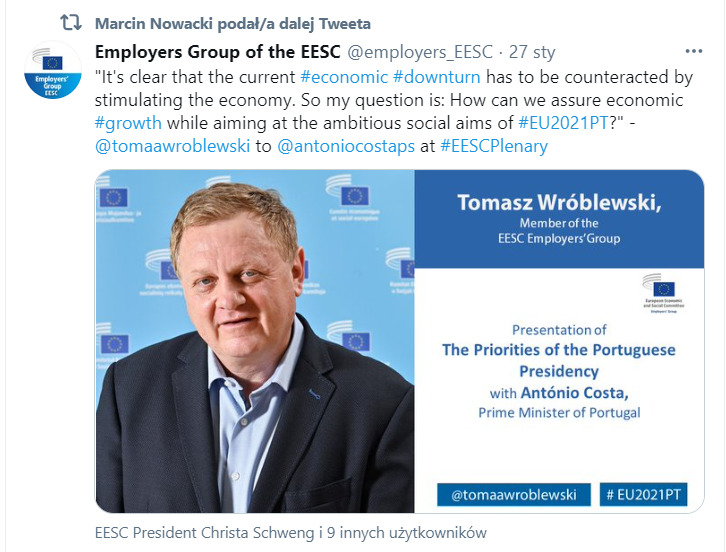Warsaw, 18th February 2021
Position of the Union of Entrepreneurs and Employers on the advertising tax
The Union of Entrepreneurs and Employers is critical of the proposal to introduce the advertising tax and calls for further works on the project to be abandoned. Our motivation is two-fold and consists of the following key factors: we are against sectoral taxes as well as oppose the introduction of any additional burdens during an epidemic or over the course of economic recovery. Meanwhile, the proposed tax would be another new fiscal obligation for companies, introduced in a relatively short time, in spite of the first economic recession in Poland in thirty years.
First of all, we would like to address to the very title of the act itself and the terminology used within. For we are dealing here with yet another case of introducing a new tax without actually calling it a tax. Recently, the “sugar levy” and the “solidarity tribute” had been adopted – this time the new tax was called the “advertising premium”. There can be no doubt whatsoever that the purpose of all the above-mentioned taxes is of a fiscal nature, even if the revenues from these taxes, in theory, are not transferred directly to the national budget, but to individual funds. The proceeds that end up in the National Health Fund support the state budget, as they effectively reduce the necessary subsidies from the budget to the Health Fund. Revenue directed to other funds lessens the pressure on the budget in the areas covered by those funds. The creation of such a structure leads to a real, gradual increase in burdens imposed on Polish citizens (the solidarity tribute is a direct blow to personal income; other taxes are easily passed on to consumers too). Consistent avoidance of calling these taxes by name, raises the suspicion that it is the government’s aim to keep the public opinion convinced that there are no new burdens – a deleterious practice and we as the Union evaluate it unequivocally negatively.
The mode how the draft act is being processed also raises our doubts. At the moment, it is in the “pre-consultation” phase, which is a welcome practice in the case of predictable, exemplary legislative processes. As a rule, however, the subject of a pre-consultation is a document discussing the assumptions of an act, presenting key concepts and intentions of the legislator. Meanwhile, as part of the currently ongoing pre-consultation, opinions are already being given to a specific draft legal act along with an explanatory memorandum. Moreover, one should note that the presented act concerns an exceptionally wide group of entities, both representatives of traditional media and digital platforms or producers (and therefore advertisers) of products considered to be qualified goods. Nevertheless, as part of the pre-consultation, there are only 14 days provided for comments. It would be reasonable for the Ministry of Finance to clearly indicate the further legislative path envisaged for the discussed draft act. If no decision is taken to withdraw from further works, it seems most appropriate to apply the government legislative process and regular public consultations, then prepare a report in which the authors would address the comments and organise a consensus conference with all interested parties. This is the only way one can conceive of a reliable legislative process relating to a draft act of such a broad scope.
As we have mentioned at the beginning, the Union of Entrepreneurs and Employers is against sectoral taxes. We do not at all understand why the legislator chose to impose this new particular levy on the (very broadly understood) advertising industry. Nowhere in the explanatory memorandum to the draft act is the selection of companies to become taxpayers of the new tax backed by argument. This is all the more surprising as, for example, the outdoor advertising sector has experienced a decline in revenues of several dozen percent as a result of the pandemic. Small and medium-sized companies in this industry may not survive additional burdens, especially in the context of a gradually declining market share and a high share of fixed costs in budgets (for instance, long-term lease contracts for outdoor advertising purposes with specific amounts and rates). Similar problems can be noticed, for example, on the television advertising market, where smaller broadcasters may particularly be affected by this new tax, as their revenues are mainly based on advertising.
No justification was also provided in the case of “qualified goods”, the advertising of which is to be subject to a higher tax rate. Merely in the communique accompanying the published draft act, together with the explanatory memorandum, one can find a piece of information that the higher rate will apply to revenues from advertising of goods that are “detrimental to one’s health”. This is a surprising criterion, largely due to the products to which it is to apply. Beverages containing sweeteners are already subject to the sugar tax, the proceeds of which, in accordance with that act, contribute mostly to the National Health Fund. Only in January 2021, beverage producers paid sugar tax to the Fund in the amount of several dozen million zlotys. Therefore, the proposal to re-cover them with an additional levy, also contributing to the National Health Fund, is unacceptable and in practice leads to multiple taxation of the same products.
Similarly, it is difficult to find a rational justification to support the selection of products that are “detrimental to one’s health”, and the authors of the project themselves are far from helpful in this matter, as one can find medicine and dietary supplements there too. The conclusion that medicinal products (legally approved to be sold and purchased) or dietary supplements (subject to registration procedures and supervision of the Chief Sanitary Inspectorate) are goods that are harmful to one’s health is impermissible and devoid of any substantive basis. With regard to the presented catalogue of qualified goods, it is possible to raise the issue of unequal treatment of entities operating on the market by discriminatory and arbitrary justification bereft of substance, by means of higher rates of advertising revenues for certain products.
What is also noteworthy are the (in all probability, unintended) other side effects of the approach proposed by the legislator. Having analysed the structure of the agri-food market, we can claim, for example, that the solutions presented, by leading to an increase in advertising costs, will in a way of their own hamper the competitiveness of branded products compared to products sold under private labels of stores.
Following up on our arguments regarding the sectoral character of the proposed tax, it is impossible not to mention the excerpts of the draft that resemble the assumptions found in the previously proposed so-called digital tax. The Union of Entrepreneurs and Employers had already addressed this concept many a time and our position on this matter has remained unchanged. We believe that there is no rational reason to additionally burden an arbitrarily selected sector of the economy. Especially since there is no evidence that tax avoidance is more commonplace or severe among digital companies than within “traditional” sectors of the economy. Furthermore, one could make an effort to try and justify the argument (basing on publicly accessible data of the Ministry of Finance) that regarding the generated income, some global digital companies pay CIT in amounts even several times higher than the average Polish taxpayers.
Regarding the section of the project on online advertising, a number of aspects specific to this area should also be discussed. In the draft, advertising services rendered on the Internet are vaguely defined as “any digital services relevant to advertisement targeting”. It is an exceptionally broad and capacious description. It would be difficult to precisely determine the scope of digital services related to targeting an advertisement to recipients, let alone determine which of them are “relevant” for the targeting process. Such a definition may make the correct application of the regulation impossible. What raises further doubts is the proposed mechanism of identifying advertising recipients, which would require both taxpayers and tax authorities to process enormous amounts of data, often imprecise and in certain cases (as of now) not at all aggregated. This is another aspect of the regulation that may generate key interpretation disputes that would make its correct application extremely difficult or even impossible.
To summarise the argumentation stated above, tax optimisation schemes and CIT avoidance are common phenomena in a globalised economy and do not relate to any specific sector. If the legislator has observed a problem (one that is actually real) with the structure of the corporate income tax, we propose to consider an initiative in the field of a universal revenue tax that is difficult to avoid.
Ultimately, the project is to introduce an additional burden in the course the fiscal year. Moreover, during a pandemic. Entrepreneurs are once again surprised by a proposal to introduce a new type of levy – as a result, the principle of trust in the state and its laws seems to have been severely violated. Most OECD countries decide to reduce the fiscal burdens during the current pandemic. We have observed with growing concern that the Polish legislator, contrary to this universal trend, would rather aim at the introduction of novel taxes, while simply refusing to call them as such. All in all however, contrary to the claims made in explanatory memoranda and various announcements, the economic cost of all these new burdens will in practice be borne by consumers. Therefore, the purchasing power of wages and the financial situation of households are both going to deteriorate – all this during an epidemic that made the unemployment rate soar to 6.5%.
Furthermore, the short vacatio legis deserves to be strongly criticised. The proposal that the new burden should enter into force later this year, as early as July, is unacceptable.
To sum up, the Union of Entrepreneurs and Employers calls for the works on the new tax to be abandoned. We oppose the introduction of any sectoral burdens, and proposing new taxes during an epidemic is both contrary to our concept of counteracting its negative economic effects as well as stands in opposition to the practices of most OECD countries. Besides, the proposed solutions are discriminatory against specific categories of economic entities. We are open to a discussion about tightening the tax system and we have our own idea how to do it: a universal revenue tax. However, we are against a burden, introduced in an ad hoc manner, on arbitrarily selected sectors, under the misleading banner of “premiums” to support healthcare, culture or protection of historic monuments. Especially since the costs of the new advertising tax will easily be passed on to producers (sometimes of key categories of goods, such as food or medicines), and later to consumers. As with any increase in burdens, its effect will therefore be prices going up and the purchasing power of households going down.
See more: 18.02.2021 Position of the Union of Entrepreneurs and Employers on the advertising tax

 ZPP Newsletter
ZPP Newsletter















Recent Comments